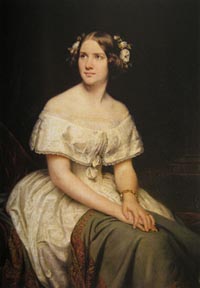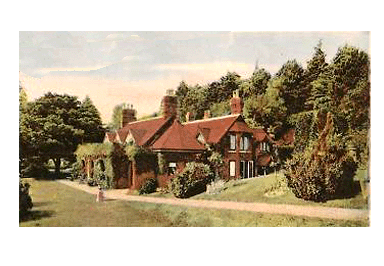Jenny Lind (1820 - 1887)


Wynds Point
Johanna Maria Lind (better known as Jenny Lind) was born in Stockholm and became a famous opera singer. Such was the beauty of her voice that she was endearingly named "the Swedish Nightingale". One of those highly regarded singers of the 19th century, Jenny Lind is known for her performances in soprano roles in Sweden and the rest of the Europe.
Jenny became famous after her performance in "Der Freischutz" in 1838. After this she was in great demand for a decade. After three acclaimed seasons in London, she was invited to America by Phineas Barnum for 150 concerts where she earned $250,000. During most of the 1840s, Jenny performed widely in Germany, especially with Felix Mendelssohn in Leipzig, and in Vienna. Mendelssohn worked with Jenny on many occasions and wrote the beginnings of an opera "Lorelei" for her, based on the legend of the Lorelei Rhine maidens; the opera was unfinished at his death. He included a high F sharp in his oratorio "Elijah" ("Hear Ye Israel") with Lind's voice in mind. Jenny retired as an opera singer in 1849, before she was 30, but continued to sing in concerts and to teach at the Royal College of Music, where she became a professor of singing. She married the composer and pianist, Otto Goldschmidt, a former pupil of Mendelssohn's, in 1852. Together they had three children and were devoted to each other. They built their house at Wynds Point, where they lived until she died in 1887. Her final public performance was given in 1883 at the "glass concert hall" (built by William Ryland in 1881) which possessed fine acoustics, particularly suited to her voice. He lived on until 1907. They are buried together in Great Malvern Cemetery.
She bequeathed a considerable part of her wealth to help poor Protestant students in Sweden receive an education. Jenny Lind is honoured in Poets' Corner, Westminster Abbey with a plaque placed under the statute of Handel. Round her head are the words inextricably associated with her legendary purity of voice, generosity of spirit, and unwavering religious conviction: "I know that my redeemer liveth".
Perhaps the best summary of her life and career was given by the Swedish king, Oskar II: "She was like a meteor blazing its trail above the heads of a wondering world".